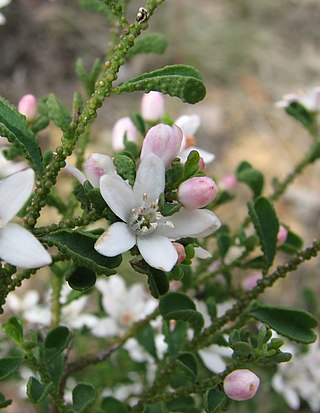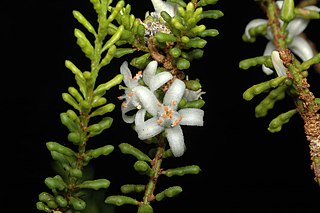
Philotheca verrucosa, commonly known as fairy wax-flower or Bendigo wax-flower, is a species of flowering plant in the family Rutaceae and is endemic to south-eastern Australia. It is a small shrub with prominently glandular-warty branchlets, heart-shaped or egg-shaped leaves with the narrower end towards the base, and white flowers usually arranged singly in leaf axils.

Philotheca myoporoides, commonly known as long-leaf wax flower, is a species of flowering plant in the family Rutaceae and is endemic to south-eastern Australia. It is a shrub with sessile, oblong to egg-shaped, glandular-warty leaves and white to pink flowers arranged singly in leaf axils. Prior to 1998 it was known as Eriostemon myoporoides.
Philotheca pungens, commonly known as prickly waxflower, is a species of flowering plant in the family Rutaceae and is endemic to south-eastern Australia. It is an undershrub with linear to narrow oblong or needle-like leaves and white flowers usually arranged singly in leaf axils.

Philotheca angustifolia, commonly known as narrow-leaf wax flower, is a species of flowering plant in the family Rutaceae and is endemic to south-eastern Australia. It is a shrub with small leaves and white flowers with five egg-shaped petals in spring.

Philotheca hispidula is a flowering plant in the citrus family and is endemic to New South Wales. It is a small shrub with narrow egg-shaped to wedge-shaped leaves that are glandular-wavy on the edges, and white or pale pink flowers arranged singly in leaf axils.
Philotheca cuticularis is a species of flowering plant in the family Rutaceae and is endemic to Queensland. It is a rounded shrub with small, crowded leaves and small white flowers arranged singly on the ends of branchlets.

Philotheca deserti is a species of flowering plant in the family Rutaceae and is endemic to inland Western Australia. It is an erect shrub with narrow spindle-shaped, glandular-warty leaves and white flowers arranged singly in leaf axils.

Philotheca epilosa is a species of flowering plant in the family Rutaceae and is endemic to eastern Australia. It is a shrub with egg-shaped to lance-shaped leaves with the narrower end toward the base and crowded near the ends of the glandular-warty branchlets, and white flowers usually arranged singly on the ends of the branchlets.
Philotheca ericifolia is a species of flowering plant in the family Rutaceae and is endemic to New South Wales. It is a much-branched shrub with glandular-warty branchlets, needle-shaped leaves and white to pink flowers arranged singly or in groups of up to six on the ends of the branchlets.

Philotheca linearis, commonly known as the rock wallaby shrub or narrow-leaf wax-flower, is a species of flowering plant in the family Rutaceae and is endemic to an inland areas of southern Australia. It is a shrub with glandular-warty branchlets and leaves, club-shaped to cylindrical leaves and white flowers arranged singly in leaf axils.

Philotheca myoporoides subsp. acuta is a subspecies of flowering plant in the family Rutaceae and is endemic to New South Wales. It is a shrub with narrow oblong or narrow elliptic leaves and white flowers arranged singly or in groups of up to three in leaf axils.

Philotheca myoporoides subsp. brevipedunculata is a subspecies of flowering plant in the family Rutaceae and is endemic to New South Wales. It is a shrub with oblong or egg-shaped leaves and white or pink flowers arranged singly or in groups of up to three in leaf axils.

Philotheca myoporoides subsp. myoporoides, commonly known as long-leaf wax flower, is a subspecies of flowering plant in the family Rutaceae and is endemic to south-eastern continental Australia. It is a shrub with oblong to elliptic or egg-shaped leaves and white or pink flowers arranged in groups of three to eight in leaf axils.
Philotheca nutans is a species of flowering plant in the family Rutaceae and is endemic to the south-west of Western Australia. It is a small, densely-branched shrub with club-shaped to cylindrical, glandular-warty leaves and pendent, pale yellow to pale red flowers arranged singly in leaf axils.

Philotheca pachyphylla is a species of flowering plant in the family Rutaceae and is endemic to Western Australia. It is a small shrub with fleshy, oblong, prominently glandular-warty leaves and white flowers arranged singly in leaf axils.

Philotheca pinoides is a species of flowering plant in the family Rutaceae and is endemic to the south-west of Western Australia. It is a small, erect undershrub with needle-shaped, glandular-warty leaves and pale pink or red flowers arranged singly or in groups of up to three in the axil of leaves at the end of branchlets.

Philotheca queenslandica is a species of flowering plant in the family Rutaceae and is endemic to south-eastern Queensland. It is a wiry shrub with elliptic to egg-shaped leaves with the narrower end toward the base and densely crowded near the ends of the glandular-warty branchlets, and cream-coloured flowers tinged with pink and arranged singly in leaf axils.
Philotheca rhomboidea is a species of flowering plant in the family Rutaceae and is endemic to the south-west of Western Australia. It is a small undershrub with thick, broadly elliptic to round leaves and white to pale pink flowers arranged singly or in twos or threes at the end of branchlets.

Philotheca virgata, commonly known as Tasmanian wax-flower, is a species of flowering plant in the family Rutaceae and is endemic to south-eastern Australia. It is a slender, erect shrub with wedge-shaped to oblong leaves and white or pale pink flowers at the ends of branchlets. It is the only philotheca with four sepals and petals.
Philotheca wonganensis, commonly known as Wongan philotheca, is a species of flowering plant in the family Rutaceae and is endemic to the south-west of Western Australia. It is a shrub with thin, cylindrical leaves and white flowers with a pink central stripe, usually arranged singly in leaf axils.













